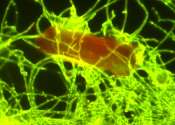Study identifies fungus that breaks down ocean plastic
A fungus living in the sea can break down the plastic polyethylene, provided it has first been exposed to UV radiation from sunlight. Researchers from, among others, NIOZ published their results in the journal Science of ...









